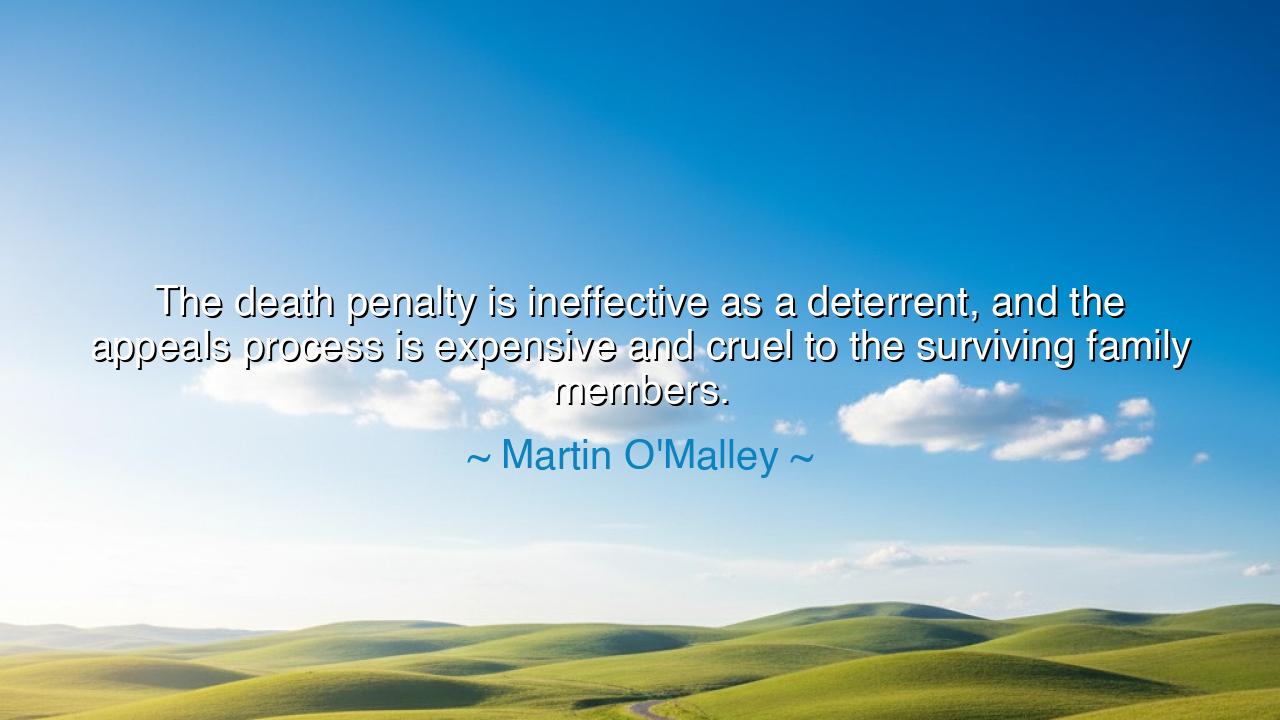
The death penalty is ineffective as a deterrent, and the appeals
The death penalty is ineffective as a deterrent, and the appeals process is expensive and cruel to the surviving family members.






Host: The room was quiet, save for the faint rustling of paper on the desk and the distant hum of the city outside. Jack sat at the table, his brow furrowed as he read through the article in front of him. Jeeny, sitting across from him, watched the flicker of emotion pass across his face. The weight of the topic seemed to hang in the air, a silent tension settling between them.
Jeeny: (carefully) “What’s on your mind, Jack?”
Jack: (pausing, his voice thoughtful) “I was reading something by Martin O'Malley. He talked about the death penalty, and how it's ineffective as a deterrent, and how the appeals process is not just expensive, but also cruel to the surviving family members. It’s something that’s been on my mind for a while now. The whole idea of justice and what we’re really achieving with it.”
Host: Jeeny sets her cup down, the soft clink of ceramic against the table breaking the stillness. She leans forward slightly, her expression one of curiosity, but also concern. The topic was heavy, and she could feel the weight of it.
Jeeny: “It’s a powerful statement. I think most people don’t consider the impact on the families who are left behind. The death penalty is supposed to serve justice, but does it? Or does it just continue the cycle of pain, extending the trauma to everyone involved?”
Jack: (nodding slowly) “Exactly. We often hear about how the death penalty is meant to deter crime, to give people a sense of justice. But studies show it doesn’t actually work that way. It doesn’t stop people from committing heinous crimes. And the process — the long appeals, the years of waiting — it only drags out the suffering for everyone, especially the families of the victims.”
Host: The room feels heavier now, the quiet between them marked by the deep conversation that hangs in the air. The truth of the words seems to resonate deeply, and the stillness of the moment invites reflection.
Jeeny: (softly) “It seems almost counterproductive, doesn’t it? Instead of offering closure, it keeps families locked in a state of uncertainty, forced to relive their pain over and over again. And all that time, money, and energy that’s spent on legal battles… Couldn’t that be used for something more constructive?”
Jack: (with a quiet intensity) “Yes, it could. Think about how many resources go into maintaining the death penalty — the trials, the legal battles, the lengthy process of appeals. And for what? We know it’s not a deterrent. In fact, there’s no real evidence that it lowers crime rates. And when the appeals process stretches out for years, the families of victims never really get the closure they need.”
Host: Jeeny pauses for a moment, her eyes reflective. She gazes out the window for a moment, lost in thought, before turning back to Jack. The air in the room feels charged, their shared understanding of the issue creating a quiet tension.
Jeeny: “And what’s the alternative? If we take away the death penalty, what’s the best way to ensure justice is served without perpetuating this cycle of suffering?”
Jack: (sighing) “That’s the hard part. It’s not about letting people get away with murder or turning a blind eye to the crime. It’s about finding justice in a way that doesn’t prolong the pain. Life sentences without parole, restorative justice — there are other ways to make sure someone pays for what they’ve done without continuing to destroy the people who’ve already been hurt.”
Host: The room falls into a reflective silence, both Jack and Jeeny lost in their thoughts, each contemplating the complexity of justice, punishment, and the consequences of societal choices. The truth of O'Malley’s words seems to hang in the air — a quiet reminder of the costs we often overlook in the pursuit of retribution.
Jeeny: “I think the real question is, what do we believe justice to be? Is it about revenge, or is it about healing? Because if it’s about healing, then continuing to punish people through a system that never ends isn’t the way forward.”
Jack: (quietly, nodding) “It’s about understanding that justice isn’t always about taking someone’s life, but about creating a system that truly heals those who’ve been wronged. It’s about addressing the root causes and ensuring that the cycle of violence doesn’t continue. Ending the death penalty doesn’t mean excusing the crime; it means choosing a path forward that’s focused on recovery, closure, and the well-being of everyone involved.”
Host: The weight of their conversation lingers, the quiet realization that true justice may not lie in the retribution of life for life, but in the more difficult, more complex work of restoring balance in a way that leads to true healing. The room, filled with the weight of reflection, feels a little quieter now, as if the world itself is listening, waiting for something to shift.






AAdministratorAdministrator
Welcome, honored guests. Please leave a comment, we will respond soon